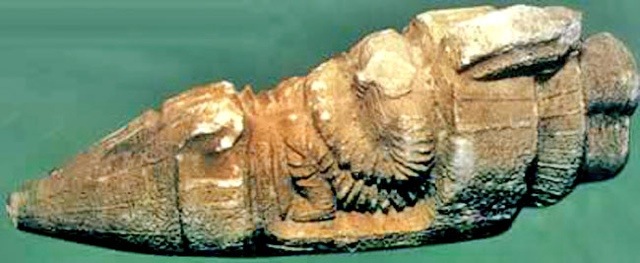A sculpted scale model of what, to modern eyes, looks like a cone-nosed rocket-ship… Powered by a cluster of four exhaust engines in the back surrounding a larger exhaust engine, the rocket-ship has room for a sole pilot—actually shown and included in the sculpture.
Zecharia Sitchin one of the leading writers and investigators of the Astro Archaeology movement has traveled the world many times over in search of out-of-place-artifacts. He discovered that the Istanbul Museum of Archaeology had been holding a stone carved relic that so closely detailed a modern space capsule that they refused to display it. The curators assumed that it had to be a hoax. The amazing vehicle displays many features of a modern day capsule, rocket exhaust nozzles in the back, and a cockpit with pilot seated and wearing a pleated flight suit with his hands at the controls. After meeting with the museum curators and studying the carving Zecharia Sitchin determined the artifact was consistent with many others that he had seen from ancient times and suggested that the museum display the artifact. He encouraged the curators to allow museum visitors to make up their own minds as to whether the object was a spaceship.
In his article in Atlantis Rising Magazine, Issue 15, Sitchin describes this object as,
“A sculpted scale model of what, to modern eyes, looks like a cone-nosed rocket-ship… Powered by a cluster of four exhaust engines in the back surrounding a larger exhaust engine, the rocket-ship has room for a sole pilot—actually shown and included in the sculpture.”
He describes the pilot as sitting with legs folded toward his chest, and wearing a one-piece “ribbed pressure suit” which becomes boots at the feet, and gloves at the hands, and points out that since the pilot’s head is missing, we cannot know whether the pilot wore a helmet, goggles, or other headgear. The artifact measures 23 centimeters long, 9.5 cm high, 8 cm wide, or 5.7 inches long, 3.8 inches high, and 3.5 inches wide.
Sitchin spent years tracking down the artifact, until he located it at the Archaeology Museum in Istanbul. It was excavated at Toprakkale, a city known in ancient times as Tuspa, where the kingdom of Urartu reigned briefly over 2500 years ago. The museum curators decided this small artifact must be a forgery because it differs from the era’s style, and more importantly, it looks like a space capsule.
It’s hard to deny this looks live evidence of ancient space travel, and the item remains an unexplained mystery
Source: Cool Interesting Stuff


































Leave a Comment
You must be logged in to post a comment.